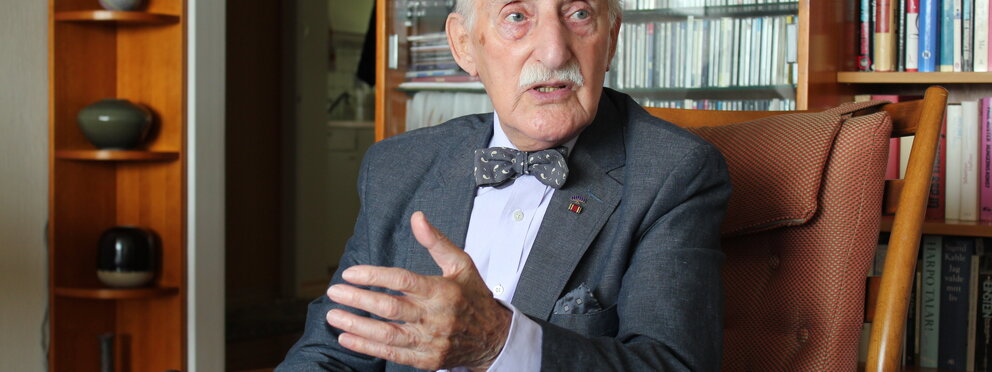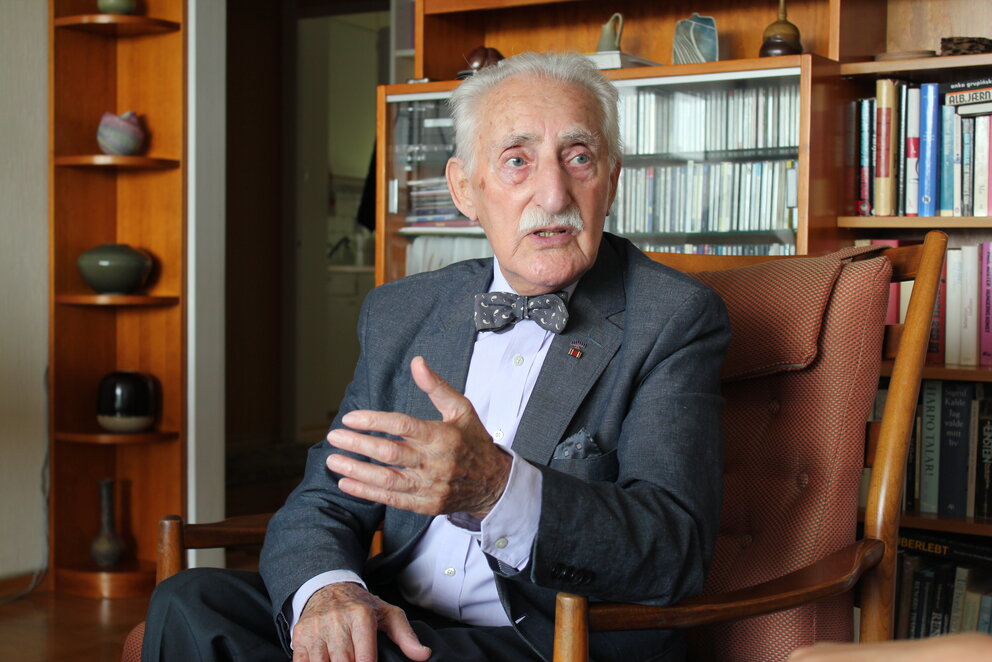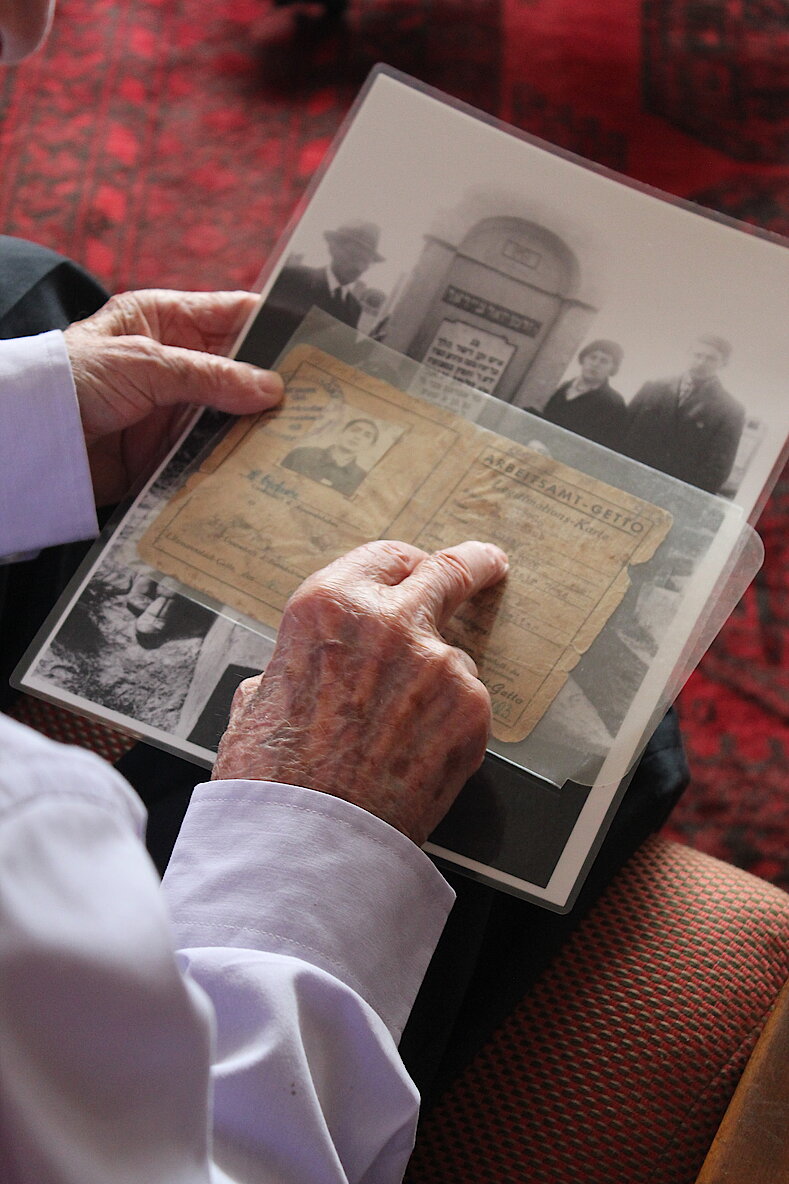
Leon Weintraub
About Leon Weintraub
Dr Leon Weintraub was born on 1 January 1926 in Łódź, Poland, the son of a collector of old clothes (rags, schmates) and a laundress. Leon grew up in poor but happy circumstances on the edge of the slums in Łódź, where life took place on the streets and he learnt to read by himself. Leon spoke Polish at home with his four sisters and Yiddish with his mother. In 1939, when Leon was 13 years old, the Wehrmacht invaded Poland and a few months later the Weintraub family was taken to the Litzmannstadt ghetto. There he worked in a factory (galvanisation, plumbing and electrical workshop). When the deportations from Litzmannstadt began, the Weintraub family went into hiding but were discovered. In August 1944, they were deported to the Auschwitz-Birkenau concentration camp. Leon escaped being gassed there by joining a prisoner transport unnoticed. He was sent to the Dörnhau satellite camp in Groß-Rosen, where he carried out electrical work. A year later, Leon was transferred to Flossenbürg concentration camp and later to Natzweiler-Struthof concentration camp/ Offenburg detachment. After a month, Leon managed to escape from the transport in the direction of Lake Constance. After several weeks of treatment in the military hospital in Donaueschingen, he arrived in Constance on Lake Constance. By chance, Leon learnt that three of his sisters had survived the Bergen-Belsen concentration camp, and he eventually found them there. Other family members who survived the Holocaust were 6 cousins, the children of 2 uncles, and 6 cousins, the children of an aunt. After the war, Leon studied medicine in Göttingen and obtained his doctorate in Warsaw in 1966. In 1969, when he lost his position as a senior physician, he emigrated to Sweden, where he still lives today.
"We are all born human and I hope, as I tell the students, that you remain human. In life, it is always important to want something, to desire it and to strive to fulfil it. You have to have imagination and emotions and not just be a robot."

A picture to live on
Leon Weintraub is 91 years old at the time of the interview and has survived four concentration camps. He has made it his life's work to pass on the atrocities of the Nazi regime and, even at an advanced age, continues to travel tirelessly from country to country to ensure that what happened is not forgotten. His family and the urge to pass on his experiences still give Leon the strength to enjoy his life to the full after the war and to share his life story with the world.

Our encounter
First encounter: I am sitting in the foyer of the "Centre for Dialogue and Prayer" educational centre in Oświęcim (Poland) and see a smartly dressed, upright and friendly person next to me. Despite his advanced age, he seems lively and young, and not just because he is sitting in front of an Apple computer and skyping on his mobile phone. I speak to him, which is not usually my nature. We quickly and easily get into a meaningful, humorous and cordial conversation. For example, when I ask "Where are you from?", I get the answer "From my mum!". I now realise the deep meaning of this sentence for Leon, who still keeps the last picture of his mother on the ramp in Auschwitz deep in his heart. In this sentence, he also conveys the message that is important to him in all his encounters with young people: It is not skin colour, not nation, not language or other outward appearances that make a person - but their willingness to meet one another without prejudice and to see the chance of a new beginning in every person. This is what Leon Weintraub, the rationalist and gynaecologist who has accompanied thousands of children on their way into this world, lives.
That same evening, Leon spontaneously meets with our group, which consists of students and staff from the Niederrhein University of Applied Sciences as well as ZWEITZEUGEN volunteers. He touches the hearts and minds of our participants and forges a bond that inevitably leads to further encounters to this day.
Second encounter: Stockholm. We accept Leon's invitation to his place of residence, a small flat in the city that he lives in with his lovely wife Evamaria. He chauffeurs us through the streets to his summer house, showing us so much of his life, from the past to the present. A pace, a vigour, a joie de vivre that inspires and infects us. Anyone who knows Gene Kelly as he dances around the lamppost in the rain will also see Leon. Coupled with an alert and sharp mind, he is not afraid to look into the abysses of the past and return to the life he considers so precious and worth living.
o more is discovered. His curiosity is driven almost to infinity - an elixir of life? Or is it all "just" a happy coincidence? Not "just"! Leon loves coincidences!
In addition to his great love for his wife, there is another passion that has become an integral part of his personality: his enthusiasm for Ludwig van Beethoven's Violin Concerto in D major, op. 61 (and 61a). This is a development that he describes with the term "Mount Everest syndrome": The higher you climb, the further you see. The more you devote yourself to music, the more you discover. This drives his curiosity almost to infinity - an elixir of life? Or is it all "just" a lucky coincidence? Not "just"! Leon loves coincidences!
Author: "Zweitzeuge" Matthias Hakes
